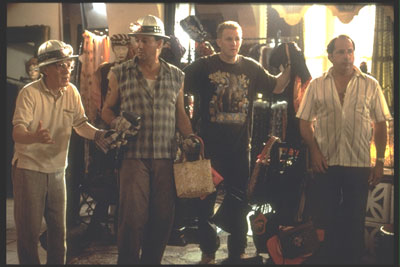Small Time Crooks (2000)

"What I was going for was a funny movie. Although I guess you could say if there's a theme to the film, it might be 'be careful what you wish for." -- Woody Allen
Small Time Crooks is a small picture, by Allen's own admissions. You'd have to go back to Manhattan Murder Mystery (1993) to find a picture of his so whole-heartedly chasing laughs, and so successfully succeeding. Themes of life and death are not explored, religion is hardly mentioned, and New York City barely even figures into the plot. If any major theme is explored in the film, it is that of the emptiness of money and success, though rarely are we hit over the head with this notion. Instead, Allen and his cast plays the film for laughs, hard laughs, belly-laughs that are at times so inspired it's almost as if Allen were back in the 1970's. Cheap laughs and slapstick mix wonderfully with Allen's trademark wit and clever one-liners, forming the structure of a film that never tries too hard to be anything other than funny and enjoyable. The mean streak that critics have attacked in Allen's three films prior to this is completely absent here - even the idiots are treated with love by Allen's script. The only "mean" character is the familair Allen "villain": the intellectual snob that revels in his own intelligence and character. Englishman Hugh Grant is pitch-perfect for the part.
The first act of the film tells the story of Ray and Frenchie Winkler, a married couple whose love for each other is often hidden by their frequent bickering (a la The Honeymooners, an admitted influence on the film), and their attempts to pull off a robbery. It is Ray's idea from the start, Frenchy (Tracey Ullman) is merely needed to act as a "front". Ray pieces together a rag-tag band of inept criminals and together they conspire, often idiotically, to rob a bank. Their plan? To move into the building two doors down and drill a hole underneath, constructing a tunnel that will lead them to the bank's vault. The only problem is, none of them is in any way competent. Thus, the robbery fails rather miserably - but remarkably, Frenchy's cookie store (the front for the robbery) becomes an instant word-of-mouth hit.
Small Time Crooks is at its best, and funniest, in its opening thirty minutes, assaulting its audience with non-stop verbal and physical comedy of the highest kind. Allen reminds us of his tremendous gift for slapstick; a scene where the "criminals" first attempt to drill into the wall is worth the price of admission and then some. Jon Lovitz and Michael Rappaport turn in admirable performances, though I wished we could have spent a little more time with their characters.
The film picks up one year after the botched robbery. The Winkler's, now tremendously rich, are attempting to entertain among the highest class of society. Despite the money, they are hopelessly inadequate and out of place in the upper tiers of society, and Allen milks this situation for plenty of laughs. Eventually, the film settles down and begins to explore the themes of money, success, and love, that it had only hinted at previously. The film loses a bit of its momentum in the middle, but quickly regains it in the final half-hour. Ullman, Allen, and Elaine May keep the film light and humorous, even in its slow spots, with tremendous comedic performances, and the whole cast seems to be having such a good time making the picture, that is nearly impossible not to like it. Now if only some people would give the film a chance.
Release Date: May 19, 2000
Domestic Total Gross: $17,266,359
Distributor: DreamWorks
Back to the Woody Allen homepage